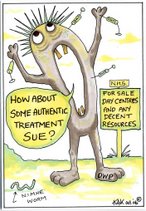.

Tennyson Obih aged 29 of Luton in the UK killed Constable Jon Henry at Luton Town Centre in 2007 and the BBC and other media have covered this in March .
Yet this text flags up the need for some more examination of similar poor NHS care themes - take for instance the 2004 killing of Constable Swindells in Aston in Birmingham by Glaister Butler aged 49 .
Both Tennyson Obih and Glaister Butler are Afro-origin and its absolutely known in the UK that Afro-origin community mental health patients have a much more dubious outcome for their care by the UK system . But a deeper sub theme perhaps lies in the question : should paranoid schitzophrenics be in the community ? Both men were unwell paranoids . Both men have now killed . What's the deeper story ?
Tennyson Obih was not taking his medication and had only a month before been in the Bedfordshire and Luton Mental Health NHS Trust care .
"A series of NHS blunders left a paranoid schizophrenic free to stab a policeman to death. Cannabis user Tennyson Obih, 29, went 'off the radar' to kill PC Jon Henry after he ditched his prescribed medicine in favour of 'olive oil and prayer'. A team of mental health visitors was supposed to monitor his progress after he was released from hospital."
Source: dailymail.co.uk
And of Glaister Butler who was supposed to be taken care of by Birmingham and Solihull Mental Health Trust (now Foundation Trust) :
"Under his community-care order, Butler was supposed to be visited every two weeks by a psychiatric nurse with his prescription drugs. He was also assessed by a consultant psychiatrist every three months. But outreach workers admitted they often simply dropped off the medication on Butler's doorstep and had "very limited opportunity" to spot changes in his behaviour. After his arrest, police found 462 prescription tablets - equivalent to 18 months' supply - in Butler's flat."
Source: independent.co.uk
Both the Bedforshire and Luton Mental Health Trust and the Birmingham and Solihull Mental Health Trust (now Foundation Trust) were either struggling with "debt" (arguably Gov't underspending on mental health) or the need to make surpluses .. Both Trusts like many others have reconfigured services, had assets sold off, and have by now shaved resources leanly to "mainstream Users" - "get them socially included"
The periods of 2004 and 2007 have seen both Trusts have to make "tough" decisions pushed by politicians to dis-invent asylum and create building-less services ..
The problem is this creates situations of mental health services on the cheap and of poorly checked vulnerable men with mental illness who effectively have no "asylum" but a community corner. These men have inner-worlds of terror or fear which when reactivated become dealt with violently . It is illness .
And yet " Community Care" - some might say "Cornered Care" as a policy , remains ..
The defence barrister at the trial of Tennyson Obih says it all :
'Your Lordship may wonder how many more tragedies have to take place before it is realised that those who are mentally ill cannot take care of themselves.'
Source: daily Mail UK
Yet this text flags up the need for some more examination of similar poor NHS care themes - take for instance the 2004 killing of Constable Swindells in Aston in Birmingham by Glaister Butler aged 49 .
Both Tennyson Obih and Glaister Butler are Afro-origin and its absolutely known in the UK that Afro-origin community mental health patients have a much more dubious outcome for their care by the UK system . But a deeper sub theme perhaps lies in the question : should paranoid schitzophrenics be in the community ? Both men were unwell paranoids . Both men have now killed . What's the deeper story ?
Tennyson Obih was not taking his medication and had only a month before been in the Bedfordshire and Luton Mental Health NHS Trust care .
"A series of NHS blunders left a paranoid schizophrenic free to stab a policeman to death. Cannabis user Tennyson Obih, 29, went 'off the radar' to kill PC Jon Henry after he ditched his prescribed medicine in favour of 'olive oil and prayer'. A team of mental health visitors was supposed to monitor his progress after he was released from hospital."
Source: dailymail.co.uk
And of Glaister Butler who was supposed to be taken care of by Birmingham and Solihull Mental Health Trust (now Foundation Trust) :
"Under his community-care order, Butler was supposed to be visited every two weeks by a psychiatric nurse with his prescription drugs. He was also assessed by a consultant psychiatrist every three months. But outreach workers admitted they often simply dropped off the medication on Butler's doorstep and had "very limited opportunity" to spot changes in his behaviour. After his arrest, police found 462 prescription tablets - equivalent to 18 months' supply - in Butler's flat."
Source: independent.co.uk
Both the Bedforshire and Luton Mental Health Trust and the Birmingham and Solihull Mental Health Trust (now Foundation Trust) were either struggling with "debt" (arguably Gov't underspending on mental health) or the need to make surpluses .. Both Trusts like many others have reconfigured services, had assets sold off, and have by now shaved resources leanly to "mainstream Users" - "get them socially included"
The periods of 2004 and 2007 have seen both Trusts have to make "tough" decisions pushed by politicians to dis-invent asylum and create building-less services ..
The problem is this creates situations of mental health services on the cheap and of poorly checked vulnerable men with mental illness who effectively have no "asylum" but a community corner. These men have inner-worlds of terror or fear which when reactivated become dealt with violently . It is illness .
And yet " Community Care" - some might say "Cornered Care" as a policy , remains ..
The defence barrister at the trial of Tennyson Obih says it all :
'Your Lordship may wonder how many more tragedies have to take place before it is realised that those who are mentally ill cannot take care of themselves.'
Source: daily Mail UK

.jpg)







No comments:
Post a Comment